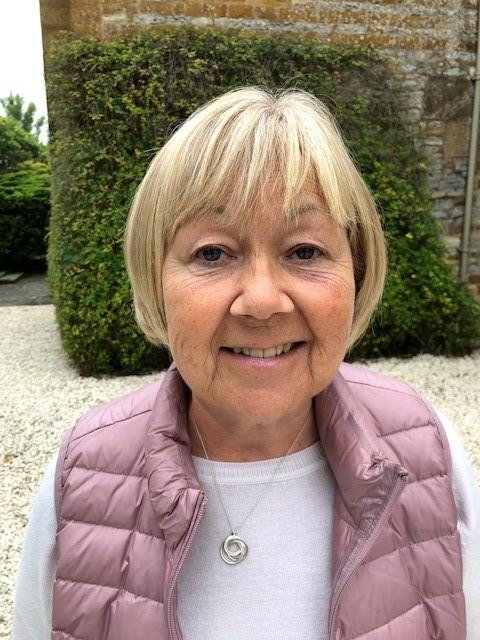Sandra
Sandra shares her experience of Waldenström’s macroglobulinaemia, COVID-19 and taking part in the RECOVERY trial.

In 2010 I was diagnosed with Waldenström’s macroglobulinaemia, a low-grade non-Hodgkin lymphoma.
I had worked for the NHS for 27 years but had noticed I was getting really tired. I put it down to the stress of the job, so decided it was time to leave that role. But the tiredness continued and in addition I started to develop stomach pains. I went to see my GP who referred me for tests. I was fortunate that my lymphoma diagnosis of Waldenström’s macroglobulinaemia (WM) was picked up straightaway.
My father-in-law had had low-grade non-Hodgkin lymphoma and tended to need treatment every 2 years or so. I thought the same scenario would be the case for me too.
After diagnosis I was put on active monitoring (watch and wait) which lasted for 6 years. In 2016, after developing symptoms, it was decided that I should start chemotherapy and was treated with RCP (rituximab with cyclophosphamide and the steroid prednisolone). Unfortunately the RCP only managed to give me a partial remission until May 2019 and I then started treatment with ibrutinib, which is a targeted drug taken daily as a tablet. I had a really good response to ibrutinib, which was keeping my WM under control.
At the beginning of March I had an overnight trip planned with my sisters. One of them began to feel cold and achy with a temperature, but at the time this didn’t really ring any alarm bells for us as COVID-19 was still very much restricted to people who had been travelling. My sister continued to go downhill and 3 days later I also had a temperature and felt cold and shivery with aching joints.
After calling the hospital, they suggested I go to A&E. They told me what I had was viral, but when I asked if it could be COVID-19, they said that because I hadn't travelled I did not fit the criteria of people likely to have it.
I clearly remember being told I had tested positive for COVID-19 and being so scared of the implications of having lymphoma too.
A week later, as I still had a high temperature and joint pain, I was tested for COVID-19. I clearly remember being told I had tested positive and being so scared of the implications of having lymphoma too.
I was still really poorly a few days later and by now was struggling with nausea and vomiting. I couldn’t keep any fluids down so got in touch with my clinical team. I was admitted to hospital where I was invited to take part in the RECOVERY trial, which looked at the benefits of dexamethasone. I recovered really well and was able to go home.
At home I started to feel breathless after 24 hours, which was really frightening. I was taken back into hospital where I was given oxygen to help. It was really scary and I honestly thought it could only end one way. I had received the shielding letter that had spelled out the dangers if I got COVID-19.
Fortunately, I didn’t need to be ventilated but spent 4 weeks in hospital. It was such a hard time, especially as I wasn’t allowed any visitors. Aren’t we lucky to live in an era of mobile phones? At least we could keep in touch.
When I was diagnosed with COVID-19 I had to stop taking the Ibrutinib as it is an immunosuppressant. I then became anaemic and needed a blood transfusion and there was much discussion between the haematology and COVID teams to try and determine whether the problems were caused by the lymphoma or COVID-19.
As my breathing continued to cause me real difficulties and it was hard to get off the oxygen completely, a CT scan was done which showed blood clots in my lung. I needed to use anticoagulants, which I had to inject myself with for 3 months.
I finally came home for Easter weekend, once my breathing had improved. Unfortunately I still had a temperature after a week of being home, so was admitted back into hospital for a week, while the doctors established that the temperature was most likely caused by the uncontrolled lymphoma.
It was a difficult decision for my lymphoma team to start me back on Ibrutinib while I was still on the anticoagulant for the blood clot, but they felt my need for treatment overcame the concerns over any potential bleeding issues.
I consider myself really lucky, especially as I am not struggling with long term symptoms of COVID-19 as some people are. I was so fearful of what would happen when I was diagnosed. I went through so much but am delighted that the lymphoma didn’t stop me from beating it. Although I am nervous, I am now able to enjoy being outside and going for walks.
And my family? To everyone's surprise my husband didn't get COVID-19 (he has had an antibody test). My sister recovered after about 2 weeks and although she feels guilty having seen me early in March, we couldn't have known was was ahead for us.
My family were a huge support for me while I was ill. I am also immensely grateful to the team who looked after me when I had COVID-19 and also to my haematology team, who have always looked after me so well and got me back on treatment and to my pre-COVID blood levels.
About the RECOVERY trial
Dexamethasone is a corticosteroid used in a wide range of conditions for its anti-inflammatory and immunosuppressant effects. It was tested in hospitalised patients with COVID-19 in the UK nationally in the RECOVERY trial and was found to have benefits for critically ill patients. Preliminary findings indicate that for patients on ventilator treatment, dexamethasone reduces risk of dying by about one third and for patients requiring oxygen, mortality is cut by about one-fifth.
